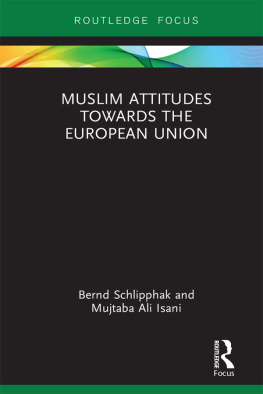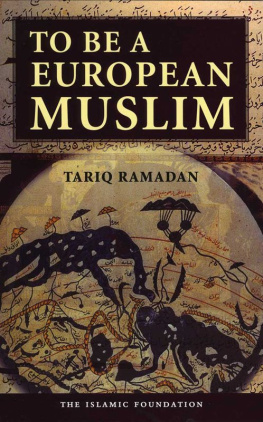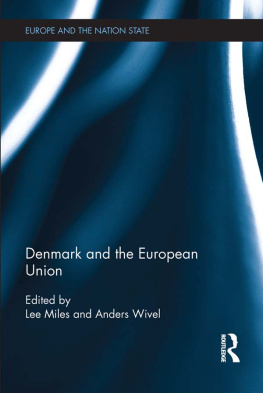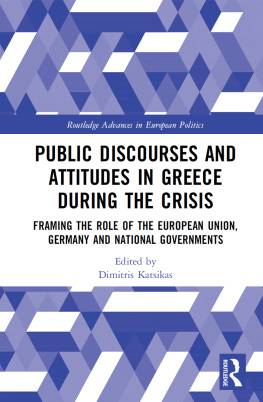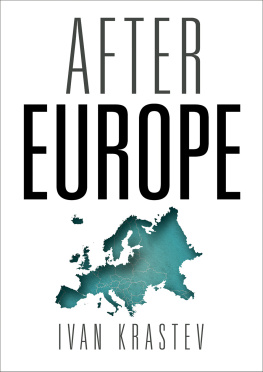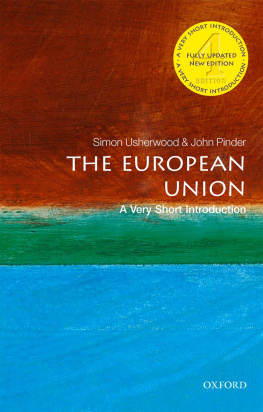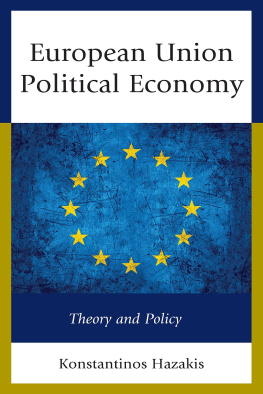Muslim Attitudes Towards the European Union
How do Muslim citizens across the globe perceive the European Union? And what factors influence their EU attitudes? This book offers the first systematic theoretical and empirical analysis of Muslim citizens EU attitudes in and outside the European Union.
Using the best empirical data available, the book demonstrates that Muslim citizens attitudes are not shaped by their denomination and religious beliefs, but by material and political considerations. It finds that Muslims are most favorable toward the EU due to their positive experiences in European contexts, whereas in contrast, Muslim citizens outside the EU are more skeptical toward the European Union due to sovereignty concerns and the lack of support from the EU and its member states. Such findings not only contribute to the research on social legitimacy of international organizations and international public opinion more generally, but also provide important suggestions for (European) policy makers regarding external and domestic policies.
This book will be of key interest to scholars, students and practitioners of European Union politics, Middle East studies, public opinion and International Relations.
Bernd Schlipphak is Professor for Empirical Methods in the Social Sciences at the Department of Political Science at the University of Mnster, Germany. His work has been published in journals such as The Review of International Organizations, European Union Politics, the Journal of Common Market Studies and the Journal of European Public Policy.
Mujtaba Ali Isani is a Post-Doctoral Fellow at the Department of Political Science at the University of Mnster, Germany. His work has been published in the Journal of Common Market Studies, Political Research Quarterly, International Political Science Review and European Union Politics.
Routledge Advances in European Politics
Dynamics of Political Change in Ireland
Making and breaking a divided island
Edited by Niall Dochartaigh, Katy Hayward and Elizabeth Meehan
European Enlargement across Rounds and Beyond Borders
Edited by Haakon A. Ikonomou, Aurlie Andry, and Rebekka Byberg
Uncovering the Territorial Dimension of European Union Cohesion Policy
Cohesion, development, impact assessment, and cooperation
Edited by Eduardo Medeiros
The Crisis of the European Union
Challenges, analyses, solutions
Edited by Andreas Grimmel
Promoting National Priorities in EU Foreign Policy
Czech Republic and the EU
Tom Weiss
Italy from Crisis to Crisis
Political economy, security, and society in the 21st century
Matthew Evangelista
Lobbying Success in the European Union
The role of information and frames
Daniel Rasch
Muslim Attitudes Towards the European Union
Bernd Schlipphak and Mujtaba Ali Isani
For a full list of titles in this series, please visit www.routledge.com
First published 2019
by Routledge
2 Park Square, Milton Park, Abingdon, Oxon OX14 4RN
and by Routledge
711 Third Avenue, New York, NY 10017
Routledge is an imprint of the Taylor & Francis Group, an informa business
2019 Bernd Schlipphak and Mujtaba Ali Isani
The right of Bernd Schlipphak and Mujtaba Ali Isani to be identified as authors of this work has been asserted by them in accordance with sections 77 and 78 of the Copyright, Designs and Patents Act 1988.
All rights reserved. No part of this book may be reprinted or reproduced or utilised in any form or by any electronic, mechanical, or other means, now known or hereafter invented, including photocopying and recording, or in any information storage or retrieval system, without permission in writing from the publishers.
Trademark notice: Product or corporate names may be trademarks or registered trademarks, and are used only for identification and explanation without intent to infringe.
British Library Cataloguing-in-Publication Data
A catalogue record for this book is available from the British Library
Library of Congress Cataloging-in-Publication Data
A catalog record has been requested for this book
ISBN: 978-1-138-60705-7 (hbk)
ISBN: 978-0-429-46735-6 (ebk)
Typeset in Times New Roman
by Apex CoVantage, LLC
This book is a product of our research project on Foreign States and International Organization in the Perception of the Arab Publics at the University of Muensters Excellence Cluster on Religion and Politics (A2-24). The initial puzzle that motivates this book is empirical in nature: Arab Muslims are shown to be less favorable of international and regional organizations such as the European Union (EU). Does this mean that all Muslims share similar (negative) feelings toward the European Union? And the second obvious question that follows is: what mechanisms and factors help us analyze Muslim attitudes?
We think that these are pertinent and important questions to answer not only for research on attitudes toward the EU but also for the general comprehension of how certain populations such as Muslims develop their opinion toward certain international actors. Given also a renewed interest in understanding the behavior of Muslims in the 21st century, especially in Europe after migration of a large number of refugees from the Arab world, we consider this work to address a timely topic bound to invoke the interest of social scientists as well as policy practitioners.
In the book we try to implement a large number of empirical tests for our theoretical model. We then also provide extensive robustness checks to ensure that our results are not artifacts of model choice or the consequence of the use a particular empirical method. We also think that this definitely also is not the final word on the topic. There is great room for more, quality empirical research on the topic, especially research that takes into account the country-level variation in public attitudes toward international actors.
Still, the general outlook we present in this book is based on a sound theoretical model and rigorous empirical tests. For the latter, we mainly use large, secondary sources of data such as the Arab Barometer, Pew Global Attitudes and the European Social Survey instead of single-country data that we ourselves collected in the framework of the above-mentioned project. Using these well-known surveys instead allows us to provide a more representative picture, covering a large number of respondents and a diversity of countries. As a result, we are able to offer more generalizable findings than would be the case with data collected within a single or a few countries. As is the case for any secondary use of data, these surveys are not ideal for our research aims. Testing a complex theoretical model of decision making, we have to restrict ourselves at some points to using proxies. Hence, some of the limitations of our empirical findings which we outline in detail in the respective chapters and in the conclusion may be due to the unavailability of even better quality data collection.


